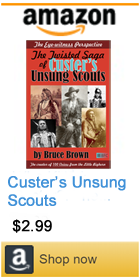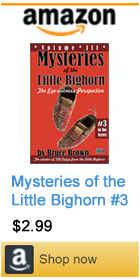From ‘100 Voices’ – Pretty Shield’s Story of the Battle of the Little Bighorn
A Crow observer’s account of the Battle of the Little Bighorn
As told to Frank Bird Lindeman. Interpreted by Goes Together.
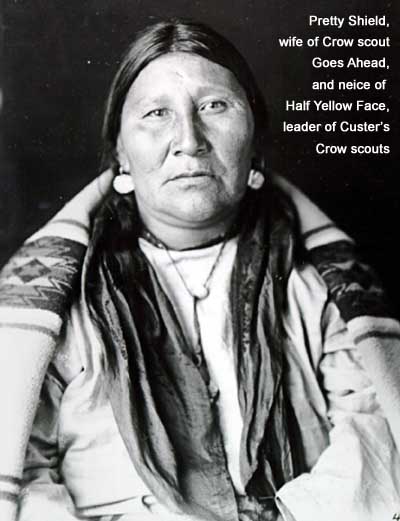
“GOES-AHEAD was with General Custer on the day he was killed on the Little Bighorn, was he not?”
“Ahh,” she smiled, with great pride in her eyes, “and for that the Great Chief in Washington sends me, every moon, a paper that I trade away for thirty dollars. And I need it for my grandchildren. I wish it were more,” she added, a quick change in her expressive face.
“Tell me about this,” I urged. “Tell me all that you remember about the fight on the Little Bighorn.”
She got up and went to the door, stood there looking out at the hill that is thickly covered with gleaming white monuments marking the supposed spots where, on the twenty-fifth of June, 1876, General Custer, and Troops C, E, I, F, and L, of the famous Seventh United States Cavalry, died to the last man.
“Were they ever buried?” I asked, standing behind her.
“I do not know, Sign-talker,” she answered, with uncertainty in her voice. “I do know that this country smelled of dead men for a whole summer after the fight, and that we moved away from here, because we could not stand it. Ahh, war is bad,” she sighed, turning back into our room. “There was always somebody missing, because of war.
“I was a young woman when Son-of-the-morningstar [General Custer] fought our old enemies, the Lacota [Lakota] and Cheyenne, on the Little Bighorn,” she went on, speaking slowly, as though collecting her thoughts. “Many of our young men went with The-other-one [General Terry]. More than one hundred, maybe fifty more, went with Three-stars [General Crook], who got whipped on the Rosebud by Crazy Horse and his warriors. Besides these many Crows went with Son-of-the-morning-star. These are the ones that you have asked me to tell you about. I will begin at the beginning.
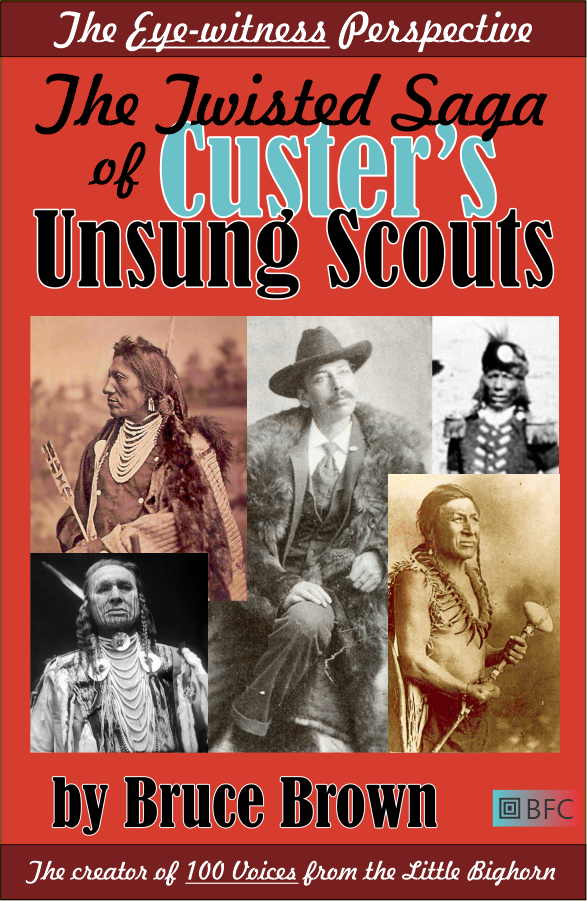
“We were camped above the mouth of Rotten-sundance-tepee [Clark Fork] when some blue soldiers came to ask our chief for some wolves [scouts]. These blue soldiers came to us in a fire-boat on the Elk river [Yellowstone]. It was in the moon when leaves were showing [May], and our chief gave a feast to our visitors who talked with our warriors in council.
“I, being a woman, did not hear what was said there. But after the talking twenty-five of our young men promised to meet the blue soldiers at the mouth of Tongue river. Half-yellow-face, my uncle, carried their pipe [was their leader]. The second night, when these Crows, who were going to be wolves for the blue soldiers, camped near the spot now occupied by the city of Forsyth, the Lacota stole every horse that they had, every one. The Crows were afoot,” she chuckled, “and they had not yet seen the white man’s war; and my man, Goes-ahead, was with them.”
These thoughts contributed much to her merriment. “Ahh, the Lacota were cunning horse-thieves,” she admitted. “Tst, tst, tst! Yes, the Lacota could steal horses almost as cunningly as the Crows. We always had many Lacota horses, sometimes hundreds of them,” she laughed. “But I am forgetting my story.
“Somebody had now to go back to the Crow village for horses before these Crow wolves could go on to the white man’s war,” she continued. “And when the two who came for horses left our village, twelve more young warriors went with them to join the waiting ones who were afoot. These Crow wolves had no interpreter with them, so that when the party finally reached the blue soldiers at the mouth of the Tongue river, a half-breed Lacota talked for them there. [Probably Frank Grouard, said to be a Sandwich Islander, whom the Indian believed to be a half-breed Sioux.]
“Our village, a large one with many, many lodges and large herds of horses, moved to The-long-drop. It was here that a Shoshone warrior came to us, asking for some more Crows. He told our men that a big blue soldier chief, named Three-stars [General Crook] had many, many men on Goose creek, where the city of Sheridan, Wyoming, stands today. This Shoshone said that his own people were going to help this big soldier chief to whip the Lacota and Cheyenne, and that this chief, Three-stars, wanted some Crows to join him, to be with him when he wiped out our old enemies. But he did not wipe them out. Instead, he got a good whipping himself. And, of course, the Crows and the Shoshones, who were with him, got a good whipping, too. And yet I believe that they did better work, that they fought harder, than the blue soldiers, who picked a bad place for their fight with Crazy Horse on the Rosebud.
“But I know only what my man, Goes-ahead, told me after the white man’s war was finished. Anyhow more than a hundred, perhaps nearly one hundred and fifty, of our young men went away with this Shoshone wolf that Three-stars had sent to our village. [Plenty-coups says one hundred and thirty.] Plenty Coups, who was then a young chief, and very brave, carried the pipe for these Crow wolves. Besides Plenty Coups, there were Flathead-woman, Medicine-crow, and Alligator-stands-up, all strong leaders and brave men, who went with the others to help Three-stars, the blue soldier chief, who was waiting for them on Goose creek.
“I cannot tell you about the fighting. I remember that they brought Bull-snake back to us badly wounded, and that many blue soldiers who had been with Three-stars were killed. I remember, too, that we moved our village to Yellow-willows [near Powell, of today] to be out of the way. There were not many young warriors left with us. There were many old men and some young boys, so that we kept rather quiet in the village at Yellow-willows until our men returned. It was here at this camp on Yellow-willows that the Crow warriors who had been with Three-stars reached us, after the fighting. The big village that had been so quiet now became lively again. And how quickly the women looked to see if their men had come back to them.”
Here Pretty-shield paused, a quizzical look in her eyes. Leaning toward me she asked in a half whisper, “Did the men ever tell you anything about a woman who fought with Three-stars on the Rosebud?”
“No,” I replied, wondering.
“Ahh, they do not like to tell of it,” she chuckled. “But I will tell you about it. We Crows all know about it. I shall not be stealing anything from the men by telling the truth.
“Yes, a Crow woman fought with Three-stars on the Rosebud, two of them did, for that matter; but one of them was neither a man nor a woman. She looked like a man, and yet she wore woman’s clothing; and she had the heart of a woman. Besides, she did a woman’s work. Her name was Finds-them-and-kills-them. She was not a man, and yet not a woman,” Pretty-shield repeated. “She was not as strong as a man, and yet she was wiser than a woman,” she said, musingly, her voice scarcely audible.
“The other woman,” she went on, “was a wild one who had no man of her own. She was both bad and brave, this one. Her name was The-other-magpie; and she was pretty.
“I have said that I know nothing about the fighting on the Rosebud, except what my man, Goes-ahead, told me. When I saw the big party of Crow wolves, who had been with Three-stars, coming back from the war, they were all singing. This told us that they had been lucky. I saw the two women, Finds-them-and-kills-them, and The-other-magpie, riding and singing with them. Finds-them-and-kills-them had a gun, and The-other-magpie a long coup-stick, with one breath-feather on its small end.
“During the fight on the Rosebud both these women did brave deeds. When Bull-snake fell from his horse, badly wounded, Finds-them-and-kills-them dashed up to him, got down from her horse, and stood over him, shooting at the Lacota as rapidly as she could load her gun and fire. The-other-magpie rode round and round them, singing her war-song and waving her coup-stick, the only weapon she had. When the Lacota, seeing Bull-snake on the ground, charged to take his scalp, The-other-magpie rode straight at them, waving her coup-stick. Her medicine was so strong that the Lacota turned and rode away; and Bull-snake was saved. All the men saw these things, and yet they have never told you about them.
“Both these women expected death that day. Finds-them-and-kills-them, afraid to have the Lacota find her dead with woman-clothing on her, changed them to a man’s before the fighting commenced, so that if killed the Lacota would not laugh at her, lying there with a woman’s clothes on her. She did not want the Lacota to believe that she was a Crow man hiding in a woman’s dress, you see.
“Yes, Sign-talker, there was a woman and a half-woman who fought on the Rosebud with Three-stars. The woman, I remember, wore a stuffed woodpecker on her head, and her forehead was painted yellow. Her coup-stick was big medicine that day, and she rode a black horse. She went to the war because her brother had lately been killed by the Lacota. She wanted to get even, and she did. Riding straight at the Lacota, with only her coup-stick, she spat at them: ‘See,’ she called out, ‘my spit is my arrows.’ She rode against a Lacota’s horse, even struck the Lacota with her coup-stick, counting a coup on him, just as Finds-them-and-kills-them fired with her gun, and killed him. When the Lacota fell The-other-magpie took his scalp. She was waving it when I saw her coming into the village with the others. Yes, and I saw her cut this scalp into many pieces, so that the men might have more scalps to dance with.”
Pretty-shield had been speaking rapidly, her dark eyes snapping. Now she leaned back in her chair. “Ahh,” she said a little bitterly, “the men did not tell you this; but I have. And it’s the truth. Every old Crow, man or woman, knows that it is the truth.”
And then as though she feared that she might have been unfair, “I am sure that your friend, Plenty-coups, has told you only the truth. But if he left this out he did not tell you all of the truth,” she added quite severely. “Two women, one of them not quite a woman, fought with Three-stars, and I hope that you will put it in a book, Sign-talker, because it is the truth.
“The return of the Crow wolves and these two women to our village was one of the finest sights that I have ever seen,” she continued, excitement gone from her eyes. “I felt proud of the two women, even of the wild one, because she was brave. And I saw that they were the ones who were taking care of Bull-snake, the wounded man, when they rode in.
“Ahh, there was great rejoicing. And of course we had a big scalp-dance. I think that the party had taken ten scalps besides the one that The-other-magpie cut into so many pieces, so there were enough for many dancers. We women, who had felt a little afraid with so many warriors gone, began now to be gay, where before we had been quiet. There was feasting on fat meat, and the big dance that lasted all night. The drums! Ahh, I liked to hear the drums, because when they were beating loudly our hearts were light as breath-feathers. And yet on this night my own man, Goes-ahead, was not with us. He was with Son-of-the-morning-star [General Custer] and the other soldier chiefs at the mouth of Tongue river.
I wished him back. In those days women were always wishing that their men were back from war, or from horse-stealing raids against the Lacota, or the Pecunnie, or the Arapahoe, or the Cheyenne. And yet they were such happy days!
“Now, after all this traveling around, I am coming to what you wished to know, the fight on the Little Bighorn. When Son-of-the-morning-star left the camp of the blue soldiers at the mouth of Tongue river he went up the Rosebud. My man, Goes-ahead, [Goes Ahead], White-swan [White Swan], Half-yellow-face [Half Yellow Face], Hairy-moccasin [Hairy Moccasin], White-man-runs-him [White Man Runs Him] and Curly [Curley] were his wolves. The country was filled with Lacota and Cheyenne. They were like ants on a freshly killed buffalo robe that is pegged to the ground. Of course the Crow wolves knew this by the sign that the enemy left, tracks, old fires, and dead buffalo whose meat had been but half taken, many such things that told the truth. Such things tell a good deal, show that men are traveling, and that they are in a great hurry to reach some place.
“My man, Goes-ahead, White-man-runs-him, and Hairy-moccasin, were ahead of Son-of-the-morning-star and his blue horse-soldiers. Half-yellow-face, who was my uncle, and carried the pipe [commanded], and Curly were with Son-of-the-morning-star. Curly said that he was sick, and I guess he was. Maybe what he knew was ahead of him made him sick. It was enough to make anybody feel a little like lying down for a while.
“Do you know where Busby is?” she asked, suddenly.
“Yes,” I said.
“Well, Busby wasn’t there in those days,” she laughed. “But at that point the three Crows, wolves, who were ahead of Son-of-the-morning-star saw sign that told them many, many Lacota lodges had been there, and that they had not been long gone. Some of their fires were yet smoking a little; and the three Crow wolves found a few Lacota horses there, too. These they caught. This camp was the very one that had whipped Three-stars, but nobody then knew that he had been whipped by Crazy Horse and his warriors on the Rosebud.
“My man, Goes-ahead, Hairy-moccasin, and White-man-runs-him, knew that there were more Lacota and Cheyenne somewhere ahead than there were bullets in the belts of the blue soldiers who were with Son-of-the-morning-star. They believed that they ought to tell him this, so they went back, and told him. But he only said, ‘Go on again,’ and then drank from a straw-covered bottle that was on his saddle.
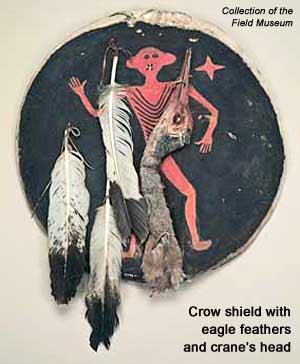
“My man, Goes-ahead, and the other two Crow wolves, went on again, as they had been told. But when they came, once more, to the place where the big Lacuta village had been, they waited there for Son-of-the-morning-star to come to them with his horse-soldiers. They knew that there were too many Lacota and Cheyenne ahead, and were afraid to go on alone.
“When he got there, and had looked around a little, Son-of-the-morning-star asked my man, Goes-ahead, if there was a better place to camp near there. Goes-ahead said that there was, that at a creek white men call Thompson there was a better place. The water that is in this creek comes from the high mountain springs, and is cool and good.
“The blue horse-soldiers went to this creek and made their camp. Before the next morning came the Crow wolves were again out, looking for the Lacota and Cheyenne. The sun was not yet near the middle of the sky when they saw the biggest village they had ever looked upon in their lives. It was on the Little Bighorn river. The flat was white with lodges, and the hills black with Lacota and Cheyenne horses, as far as they could see.
“My man, Goes-ahead, told me that he felt afraid when he saw so many lodges. He, with the two others, Hairy-moccasin, and White-man-runs-him, turned here, going up the creek that white men call Reno. They met Son-of-the-morning-star coming down this creek, and told him what they had seen. They said that there were more Lacota, more enemies, than there were bullets in the soldiers’ belts, that there were too many to fight.
“But Son-of-the-morning-star was going to his death, and did not know it. He was like a feather blown by the wind, and had to go.”
She pressed her fist against her forehead, and bent her head. “Tst, tst, tst! He would not listen,” she murmured. “And he was brave; yes, he was a brave man.
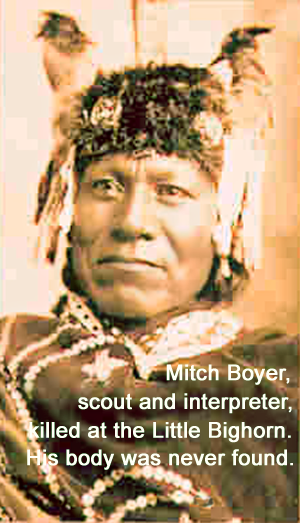
“Two-bodies, a half-breed interpreter [Mitch Boyer], listened,” she went on. He spoke to Son-of-the-morning-star, saying, ‘You can yet get safely away.’
“But the soldier chief wanted to fight. He had to fight, because he had to die. And this made others die with him,” she added, speaking slowly and with deep feeling.
“My man, Goes-ahead, told me that Son-of-the-morning-star drank too often from the straw-covered bottle, and that as soon as Two-bodies told him that he might yet get away he made a big mistake by dividing his blue horse-soldiers into three parties, sending two of them away from him.”
Pretty-shield was deeply affected here. She stood up, leaning over the table. “It was now that my man, Goes-ahead, stripped himself for battle, tying some breath-feathers in his hair,” she said, speaking rapidly. “And it was now that the little chief, Reno, went away as he had been ordered, with all of the Arickara wolves. White-swan and Half-yellow-face went with them, by mistake. And it was now that Curly, who said he was sick, ran away. Ahh, I know these things are true, because my man, Goes-ahead, was there and saw them happen.
“Reno, the little soldier chief, crossed the river and began shooting. Then he ran away, because he saw how the fight would end. Anybody would have known its end, anybody.
“My man, Goes-ahead, was with Son-of-the-morning-star when he rode down to the water of the Little Bighorn. He heard a Lacota call out to Two-bodies, who rode beside Son-of-the-morning-star, and say, ‘Go back, or you will die.’
“But Son-of-the-morning-star did not go back. He went ahead, rode into the water of the Little Bighorn, with Two-bodies on one side of him, and his flag on the other — and he died there, died in the water of the Little Bighorn, with Two-bodies, and the blue soldier carrying his flag.
“When he [Custer] fell in the water, the other blue soldiers ran back up the hill. It was now that my man, Goes-ahead, ran fast. He told me that the fighters were so many, and so crazy, that in the thick dust and powder-smoke, anybody might easily have run away. So he, White-man-runs-him, and Hairy-moccasin, ran when they saw Son-of-the-morning-star fall into the water, with Two-bodies and the blue horse-soldier that carried his flag. My man, Goes-ahead, showed me where Son-of-the-morning-star fell into the water. [Note: Mitch Bouyer, or Mitch Boyer, called Ka-pesh or Two-bodies by the Crows, was a half-breed interpreter for the Crow scouts.]
“They ran up the little creek that comes into the Little Bighorn just above the spot where Son-of-the-morning-star fell down from his horse. I will take you there, and show you. They kept running fast until they came to the packers, who had all the blue soldiers’ bullets and grub. My man, Goes-ahead, said that when he got there with Hairy-moccasin and White-man-runs-him the packers had formed a circle with their pack-train, and that the mules were falling dead, that bullets were coming like rain, and that he, with the two other Crow wolves, stopped there to help the packers fight. They dug pits there, and beside these holes, the dead mules stopped many, many bullets. My man, Goes-ahead, said that, with the packers, they killed more Lacota and Cheyenne than the blue soldiers did.”
Gradually, as she talked, her voice had grown louder, her position more tense. “Ahh,” she sighed, suddenly relaxing, “my man, Goes-ahead, told me that he was afraid; and yet he did not run away until he saw Son-of-the-morning-star f all down from his horse into the water of the Little Bighorn. He told me that Son-of-the-morning-star was ahead of his men, and that when he fell the blue horse-soldiers ran back up the hill. He took me to the place, and showed me exactly where Son-of-the-morning-star fell into the water, with Two-bodies and the flag, where he himself started to run away, and where he stopped to fight with the packers. Yes,” she said, her voice trailing off to a murmur, “my man, Goes-ahead, was afraid that day; but he did not lie to me. The monument that white men have set up to mark the spot where Son-of-the-morning-star fell down, is a lie. He fell in the water,” she whispered, as though to the shade of her man, Goes-ahead.
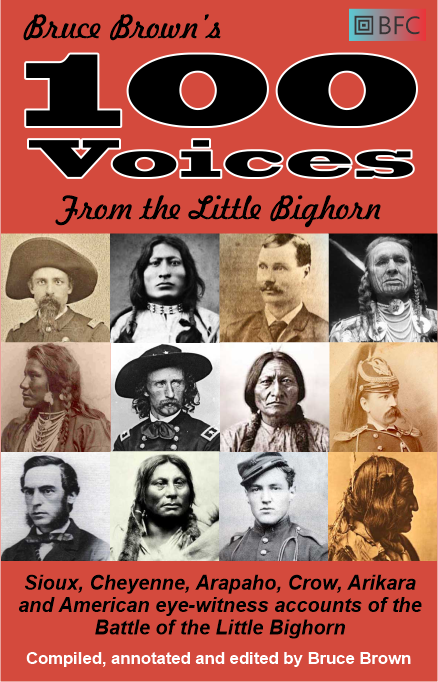
Her attitude affected me deeply. Goes-together, our interpreter, who had been sewing buckskin with an awl and sinew, laid her work aside, as though she too had been stirred by Pretty-shield‘s expressed feeling. When the old woman again spoke her words startled me.
“The sun was more than half way between the middle of the sky and the world when the yelling and shooting stopped,” she said, evenly. “It was now that White-man-runs-him spoke in Crow to my man, Goes-ahead, and Hairy-moccasin. ‘We had better get away from here before the enemy charges this place,’ he said.
“The three Crow wolves got up to go. They had good soldiers’ guns now, and thought that they could make out to reach their people.
” ‘Where are you going?’ the chief packer asked.
” ‘We are going to get a drink of water,’ signed White-man-runs-him, cunningly.
“The packer chief gave each of the three Crow wolves a canvas-covered, flat bottle to fill and bring back. But every man who had tried to fill one of those bottles had been killed, every one. The three Crows did not go after the water, did not even keep the flat bottles. They cut across to Reno creek, following it upstream until they reached pine trees. Here they saw four Lacota wolves who had been sitting on the high hills to watch for more blue soldiers. They had not been in the fighting. One of these Lacota wolves was quite a way behind the others. He was riding a gray horse, and leading a sorrel mule that must have got away from the blue soldiers. My man, Goes-ahead, killed this Lacota, and scalped him. The sorrel mule got away from Goes-ahead, but not the gray horse. The rope that the dead Lacota had dropped when my man’s bullet struck him, got tangled in the gray’s legs, so that Goes-ahead caught him. He gave this horse to White-man-runs-him. They took turns riding him, because they had no other horse. They had lost them in the fight. I well remember that old gray Lacota horse. His back was sore, and he was so old that he was no good.
“This all happened in the moon when the leaves are fully grown [June].When my man, Goes-ahead, reached the Bighorn river with the two others, he found it high, bad to cross. The water had spread out very wide. Rain was falling, and it was dark besides. The point where they reached the Bighorn was where the city of Hardin stands now. They could not see the other side of the wide river when they began to swim, so that when they reached land they thought that they were across the stream. But it was only an island they reached; and here they rested before going the rest of the way.
“They had no clothes, because they had stripped themselves to fight, and did not go back to look for any clothes. But now they felt pretty cold, and they were hungry, having had nothing to eat since the morning before the fighting on the Little Bighorn. While they were resting the day came, gray and rainy. Goes-ahead saw two wolves on the hills across the Bighorn. He believed they were Crows, but the others thought them Lacota. Anyhow Goes-ahead called loudly, and then made signs. The two wolves across the Bighorn were Crows, as Goes-ahead had believed. They came down to the water’s edge on their side, and said, in signs, that all the blue horse-soldiers were dead.
“One of these Crow wolves, who had been with The-limping-one [General Gibbon] was named No-milk. The other’s name was Plenty-butterflies. No-milk crossed the river and gave my man and the others some bacon and soldiers’ bread, and part of his clothing. He said that more blue soldiers, walking-soldiers, were coming, and that they had six wagons with them that made their traveling very slow. He said that the soldiers had told him that White-swan, and my uncle, Half-yellow-face, the two Crow wolves who had, by mistake, gone with the little soldier-chief [Reno] when Son-of-the-morning-star divided his men, were dead. While he was talking some other Crows who had been with The-limping-one [Gibbon] and The-other-one [Terry] crossed the river, and did not go back to the walking-soldiers.
“Our village was on Arrow creek [Pryor] when these Crows came to us. When our wolves saw them they signaled that the Lacota were coming. A warparty rode out to meet them, and even attacked them, by mistake. My man, Goes-ahead, had to kill two of their horses before the Crow war-party saw its mistake and stopped its foolishness. By this you can see how nervous my people were during these days of trouble. Everybody looked exactly like a Lacota to us.
“This time the home-coming of our warriors was not a happy one. I saw my man, Goes-ahead, and felt glad; but when the men who had been to war told us that Half-yellow-face and White-swan were dead, my heart fell down to the ground. They were both good, brave men, and besides, Half-yellow-face was my uncle, my father’s brother. The mourning was terrible to hear. The relatives of the two missing men gave away all their horses, and clothing, cutting themselves on their arms and legs and heads until they were bloody all over. But when my father began to mourn for his brother, Half-yellow-face, my man, Goes-ahead, stopped him. ‘Wait four days,’ he said, ‘and then if your brother does not return I will mourn with you.’
“All that night the people mourned, crying for their dead, and for Son-of-the-morning-star, and his blue soldiers, who had so foolishly died.”
She ended, abruptly, staring at the wall over my head. “Sign-talker,” she said, severely, “too much drinking may have made that great soldier-chief f oolish on that day when he died. I have seen whisky do such things. Our own chiefs have signed too many papers with their thumbs when whisky was doing their thinking for them. Our old men were not whisky drinkers. The first time that I ever saw a Crow warrior drink whisky was when a fire-boat blew up on the Big river. There were many barrels of whisky along the river there, after that fire-boat sank in the water; and some of our men drank a little and grew foolish, so foolish that we all laughed at them. But lately our men drink, and do not care who laughs.”
“Tell me about Half-yellow-face and White-swan and Curly,” I suggested, to get her back to her story. “Ahh, Curly [Curley] did not come back for a long time,” she said. “He found the blue soldiers who were with The-other-one and The-limping-one, and went with them to the place where the big fighting had been. It was not until after some white men took him to Washington that Curly talked, and then his tongue was not very straight.
“When Half-yellow-face and White-swan got back we heard their story, and it was like hearing the dead speak, because we thought they had been killed. They said that they had not understood, and had gone with the little chief [Reno] by mistake. They were with him until his men came to the big Lacota village, until the little chief’s men got off their horses to shoot, and until one of the littler chiefs tried to get back onto his horse, and got dragged. He let his foot go clear through the stirrup, and his frightened horse ran away, dragging him. When Half-yellow-face and White-swan saw this they knew it was bad medicine. They saw how things were going to end, as anybody could; and then they ran to a hole in the hill. My man, Goes-ahead, showed me this hole, and so did my uncle, Half-yellow-face; and I will show it to you.
“The Lacota set the country afire to drive them out of the hole. It was here that White-swan got shot in the hand. His hand was never any good after that day. He was also shot in the foot and in the shoulder. But the bullet only burned his shoulder, making a bloody mark there that was not bad. They stayed in that hole, even when the smoke of the Lacota fire nearly smothered them, for two days and two nights; and some of the Arickara wolves were in there with them.
“Finally the Lacota and Cheyenne left the Little Bighorn, and then the walking-soldiers came. Half-yellow-face said that they were very glad to see the walking-soldiers, because White-swan‘s wounds were swelling, and looked very bad, and because they all wanted to get something to eat.”
She hesitated a little now, and then as though to wipe away any possibly detracting statement that she had made about General Custer, she said: “Even if Son-of-the-morning-star had not divided his men he would have been whipped and killed, because he was being blown by the winds. If The-other-one, Three-stars, The-limping-one, and Son-of-the-morningstar had kept together they would have whipped the Lacota and Cheyenne; but no one of them could have done this. There were too many Lacota, too many Cheyenne.
“Two years after this bad day Half-yellow-face took my man, Goes-ahead, and me, over the ground where all these things happened. I can take you over it, and tell you exactly what he told us. Yes,” she added, “and for more than a year my people found dead blue soldiers and dead Lacota far from the Little Bighorn. I remember that in the summer following the big fight my people found four blue soldiers together, one of them a chief, beyond Big-shoulder, on Bear-in-the-middle creek. This is six miles from the fighting-place on the Little Bighorn. Our men said that, by the clothes he wore, they knew that one of these dead horse-soldiers was a chief.”
Here, suddenly reminded of her duty, Pretty-shield stood up, her blanket falling to the floor. “Ahh!” she exclaimed, glancing at the window, “the sun is low down. I have talked about war until I forgot my grandchildren. I will come again. Ho!”
Having business of my own at the Trader’s store, I followed Pretty-shield there; and was glad that I did, because her short visit had inspired an Indian of about sixty years to talk to the trader about her man, Goes-ahead.
“Goes-ahead took me there, and showed me where General Custer fell in the water,” he was saying, in pidgin English, when I entered. “And he showed me where he and White-man-runs-him and Hairy-moccasin ran up a little creek that is there, where they found the packers with their pack-train, and stopped to fight,” he went on. “Yes,” he said, “and when I was a young man I knew Big-nose, a Lacota who told me that he, himself, killed General Custer, and that the General fell in the water, with his half-breed interpreter, a man that the Crows called Two-bodies. His white name was Mitch Boyer, I guess. [Note: Big-nose was the Crows’ name for White Cow Bull. Here is his account of shooting an officer on a sorrel horse with four white socks — who can only be Custer — at the very beginning of the Custer fight.]”
There was more, most of it of little importance to me, except the telling of finding the bodies of four cavalrymen six miles from the battlefield on the Little Bighorn, the man declaring that his father had been one of the Crows who found them. “One of these dead soldiers was an officer,” he said, thus strengthening Pretty-shield‘s story. I had not doubted that she had related exactly, and in detail, her man’s experiences on the day of the battle of the Little Bighorn, and yet I was glad to get this uninvited corroboration.
Red Mother by Frank Bird Linderman, John Day Co., New York, NY, 1932 p. 222 – 247
BRUCE BROWN’S NOTES:
THIS ACCOUNT of the Battle of the Little Bighorn by Crow observer Pretty Shield is one of the three great Lost Texts — or perhaps I should say, Ignored Texts — of the Little Bighorn eye-witness canon (the other two are the accounts of Peter Thompson and White Cow Bull).
The wife of Crow scout Goes Ahead and niece of Half Yellow Face, who was the leader of Custer‘s Crow scouts, Pretty Shield provides the Crows’ candid account of the Battle of the Little Bighorn. Her story is important because she confirms Sioux warrior White Cow Bull‘s story that Custer was shot when he tried to charge across the Little Bighorn and attack the Indian village at the very beginning of the Custer fight. Pretty Shield said, “The monument that white men have set up to mark the spot where Son-of-the-morning-star [Custer] fell down, is a lie. He fell in the water.”
Another interesting aspect of Pretty Shield‘s account is her description of Crow woman warriors at the Battle of the Rosebud, particularly the tranvestite or wikte who called herself Find Them And Kills Them.
Pretty Shield also explains why Half Yellow Face and White Swan left no public account of the battle — they spent it hiding in a “hole.”
Finally, Pretty Shield gives us a vividly poetic description of Custer rushing to his death:
“But Son-of-the-morning-star was going to his death, and did not know it. He was like a feather blown by the wind, and had to go.”
* * *
Regarding Custer‘s attempt to charge across the Little Bighorn and attack the Indian village on June 25, 1876, David Humphreys Miller wrote: “The fight at the ford was described to me by White Cow Bull and Bobtail Horse [AKA Bobtailed Horse], both of whom lived to be quite old. Custer‘s fall at mid-river was witnessed simultaneously by White Cow Bull and the three Crow scouts, although White Cow Bull did not know Custer‘s identity at the time. The account of the Crows was passed on to me by Pretty Shield, widow of Goes Ahead, with whom I had my first interview in 1940 when she was almost eighty-two years of age.”
* * *
Both Arapaho warrior Sage and Seventh Infantry scout Thomas LaForge told a story concerning the death of Custer‘s half-Sioux interpreter for the Arikara scouts, Mitch Bouyer (also known as Two Bodies and Man In The Calfskin Vest), which seems to fit together like a piece in a jigsaw puzzle with the one told here by Pretty Shield.
Essentially, Pretty Shield said Bouyer was shot out of the saddle in the middle of the Little Bighorn during Custer‘s failed charge at Medicine Tail Coulee. Sage and LaForge said Bouyer was badly wounded but did not die, and that he subsequently crawled to the edge of the river, was found by the Sioux, begged to be killed, and was finally accomodated by the Sioux before they threw his body back in the river. See Who Killed Custer — The Eye-Witness Answer for more info.
* * *
Red Mother was later republished under the title Pretty Shield.


